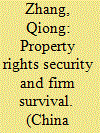| Srl | Item |
| 1 |
ID:
134879


|
|
|
|
|
| Summary/Abstract |
This paper utilizes the non-linear estimation method to simulate the Zipf distribution, and constructs an alternative measure of Hirschman–Herfindahl index (HHI), in order to reveal the real changes in monopoly of China's industrial markets. Based on the annual waves of the Chinese Industrial Enterprises Database between 1998 and 2009, it finds that: 1) systematic bias of deceptive declining concentration would be very easy to appear when directly using censored survey data with some invariant threshold; 2) with method in this article, an alternative measure of China's market concentration (namely, the estimated Zipfian parameter) can be produced to better depict monopoly trend, even though small firms are censored out in the market surveys and commonly used HHI cannot avoid such systematic bias; and 3) China actually experiences much less competition improvement or monopoly reduction in many industries during this period.
|
|
|
|
|
|
|
|
|
|
|
|
|
|
|
|
| 2 |
ID:
159062


|
|
|
|
|
| Summary/Abstract |
The security of property rights has been found to play important roles in various aspects of firm behaviors. However, its effects on firm survival have been largely neglected in previous research. Using annual data of Chinese manufacturing firms over the period 1998–2008, we analyze the link between property rights security and firms' survival probabilities, differentiating firms into stated-owned enterprises (SOEs) and non-SOEs, and considering whether the linkage evolves over time. Examining a wide range of specifications, we find that the protection of property rights, by limiting government intervention and promulgating laws and rules, is crucial for firm survival. Moreover, better security of property rights benefits non-SOEs more. We also find that the beneficial effects of secure property rights on firm survival are more pronounced for years after 2003 when China speeded up deregulation to comply with its WTO commitments and reform target to establish a modern system of property rights than for years before 2002.
|
|
|
|
|
|
|
|
|
|
|
|
|
|
|
|